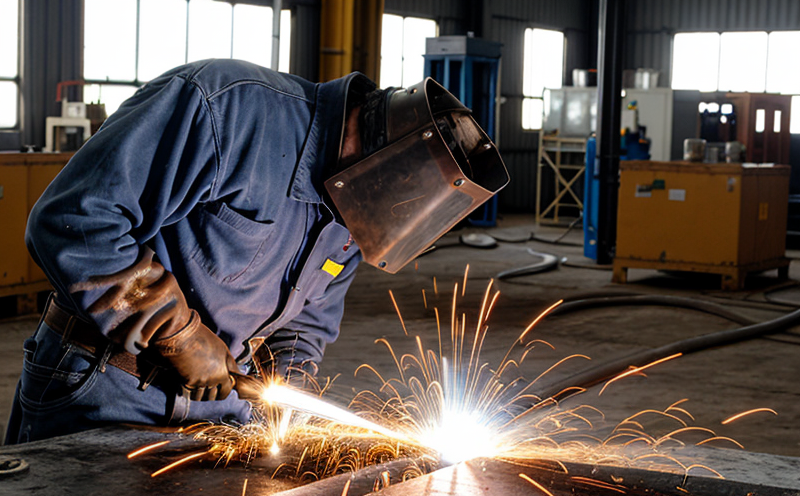IEC 62321 Hazardous Substances in Welded and Coated Materials Testing
The IEC 62321 standard is pivotal in ensuring that industrial materials, particularly those used in welded and coated applications, meet stringent safety and environmental requirements. This service focuses on the rigorous testing of hazardous substances within these materials to comply with international standards.
Welding and coating processes are critical in various sectors such as automotive, aerospace, construction, and electronics. These processes often involve the use of materials that may contain hazardous substances like lead (Pb), mercury (Hg), cadmium (Cd), chromium hexavalent compounds (Cr(VI)), brominated flame retardants (BFRs), phthalates, and other restricted materials.
Compliance with IEC 62321 is essential as it ensures that products are safe for use in consumer environments. The standard provides detailed guidelines on the permissible limits of these hazardous substances in various applications. Testing is performed using advanced analytical techniques such as Inductively Coupled Plasma Mass Spectrometry (ICP-MS), Gas Chromatography-Mass Spectrometry (GC-MS), and Fourier Transform Infrared Spectroscopy (FTIR).
Our testing laboratory adheres to the highest standards of accuracy and reliability. Our team of experts ensures that all samples are prepared meticulously, following stringent protocols laid out in IEC 62321. This includes thorough cleaning of specimens, precise cutting and grinding if necessary, and maintaining a controlled environment during sample preparation.
The testing process involves several stages:
- Sample receipt and identification
- Preparation of samples as per the standard's requirements
- Conducting the tests using appropriate instrumentation
- Data analysis to determine compliance with IEC 62321 limits
- Issuing a detailed report summarizing findings and recommendations for any necessary corrective actions.
The results of our testing are crucial for manufacturers as they provide evidence that their products meet the stringent requirements set by international standards. This not only ensures compliance but also helps in maintaining a good reputation, thereby enhancing customer trust and satisfaction.
Our laboratory is equipped with state-of-the-art equipment capable of detecting even trace amounts of hazardous substances. This precision ensures accurate results, which are essential for making informed decisions regarding the use of materials in various applications.
In summary, our IEC 62321 Hazardous Substances in Welded and Coated Materials Testing service plays a vital role in ensuring product safety and compliance with international standards. By adhering to these stringent requirements, we contribute significantly towards protecting public health and the environment.
Industry Applications
The IEC 62321 standard finds extensive use across various industries where welded and coated materials are employed. These include automotive manufacturing, aerospace engineering, construction projects, electronic device production, and many more.
In the automotive sector, compliance with IEC 62321 ensures that vehicles meet stringent safety regulations, reducing the risk of harmful emissions and improving overall vehicle performance. In aerospace applications, this standard is critical for ensuring the reliability and durability of aircraft parts under extreme conditions.
The construction industry benefits from IEC 62321 by guaranteeing that building materials used in welding processes are safe and comply with environmental regulations. For electronics manufacturing, adherence to these standards ensures that components are free from harmful substances, enhancing product safety and longevity.
By ensuring compliance through rigorous testing, our service supports industries in meeting their regulatory obligations while also contributing to the broader goals of sustainability and public health protection.
Quality and Reliability Assurance
The importance of quality and reliability assurance cannot be overstated when it comes to industrial processes like welding and coating. Our service provides a comprehensive approach to ensuring that materials used in these processes are safe and meet the highest standards set by IEC 62321.
Quality assurance is achieved through meticulous sample preparation, adherence to strict testing protocols, and the use of advanced analytical techniques. Each stage of the testing process is crucial for obtaining accurate results. Sample receipt and identification ensure that only relevant materials are tested, while preparation involves careful handling to avoid contamination or degradation.
The testing itself uses sophisticated instruments like ICP-MS, GC-MS, and FTIR, which provide precise measurements of hazardous substances present in the samples. Data analysis is performed by our experienced team, who interpret results against the specified limits outlined in IEC 62321.
Reliability assurance comes from consistent testing procedures that yield repeatable results. This consistency builds trust among clients and stakeholders, ensuring that they can rely on the accuracy of our test findings. Our laboratory is accredited to multiple international standards, including ISO/IEC 17025, which further enhances our credibility.
By providing reliable and accurate testing services, we help manufacturers maintain high-quality products that comply with global regulations. This not only protects public health but also supports the broader goals of sustainability in industry practices.
Environmental and Sustainability Contributions
The importance of environmental responsibility cannot be overstated in today's world. Our IEC 62321 Hazardous Substances in Welded and Coated Materials Testing service makes significant contributions towards sustainable industrial practices by helping manufacturers reduce their environmental footprint.
By identifying hazardous substances early in the production process, we enable companies to make informed decisions about material selection and process optimization. This proactive approach helps minimize waste generation and reduces the release of harmful pollutants into the environment.
Our service also promotes resource efficiency by encouraging the use of safer alternatives for hazardous materials. Through detailed testing reports, we guide manufacturers towards more sustainable choices that align with global sustainability goals.
In addition to supporting individual companies in their sustainability efforts, our laboratory contributes to larger environmental initiatives through collaboration with industry bodies and regulatory agencies. By sharing best practices and innovative solutions, we work collectively towards a greener future for all.





